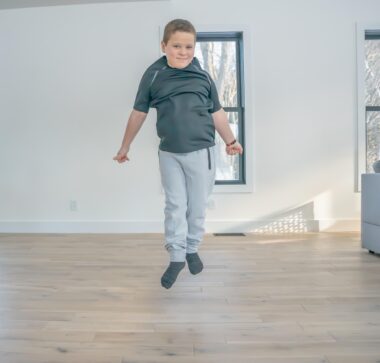Youth Cardio Exercise and Its Impact on Sleep Quality
Youth engagement in cardio exercises has sparked considerable interest regarding its multiple benefits, particularly concerning sleep quality. Cardio, short for cardiovascular exercise, is any activity that increases heart rate, which can include running, swimming, cycling, and dancing, among others. For many young individuals, incorporating cardiovascular exercise routines can have profound effects not only on physical health but also on mental well-being. Research indicates that young people who exercise regularly tend to fall asleep faster and experience deeper sleep cycles. This is especially important as sleep is crucial for growth, development, and emotional regulation among youth. However, it’s vital to establish a balanced routine. Too much cardio or exercising close to bedtime might lead to overstimulation, potentially disrupting sleep. Therefore, optimal timing and duration of these activities are essential for reaping the sleep benefits. Parents and guardians play an important role in encouraging kids and teenagers to engage in fun and enjoyable cardio activities. They should ensure that youth exercises are complemented by proper nutrition, encouraging rest and recovery alongside their exercise regimens.
The influence of cardio exercises on sleep quality extends beyond just duration; the depth and restorative nature of sleep is also enhanced. There is a clear correlation between regular cardiovascular routines and improved overall sleep patterns. The best time for youth to perform these exercises is earlier in the day or during early evening. Physical activities like jogging or team sports reinforce not only physical fitness but also contribute positively to mental states, reducing anxiety and depression. It’s widely believed that youth who engage consistently in cardio have improved mood, which can facilitate more restful sleep. Consequently, schools and communities should prioritize providing spaces and resources for youth to engage in these activities. Accessible physical education classes and organized sports can help reinforce healthy habits. Moreover, incorporating fun elements into these routines, such as dancing or group challenges, can maintain engagement and interest. It’s also essential to educate young individuals on the importance of sleep hygiene alongside exercising. Simple strategies, like maintaining consistent sleep schedules and creating a relaxing pre-sleep environment, further balance the benefits derived from cardio exercises.
Understanding Sleep Mechanics
Understanding the mechanics of sleep can provide valuable insight into how cardio exercises impact sleep quality among youth. Sleep is categorized into different cycles, primarily REM (rapid eye movement) sleep and non-REM sleep stages. Each cycle plays a unique role in physical and cognitive restoration. Engaging in cardio exercise elevates the body’s core temperature and metabolism, which can promote quicker onset of sleep. It’s crucial to note, however, that if exercises are performed too close to bedtime, that higher energy level can impact sleep adversely. Establishing a consistent exercise schedule is key; the ideal scenario would be to allow at least three hours between the end of a workout and bedtime to give the body time to wind down naturally. During sleep, the body goes through various processes crucial for recovery, including muscle growth and hormone regulation, which can be positively influenced by a robust cardio routine. When individuals, particularly youth, engage in regular cardio activities, they can observe an increase in overall energy levels and mood stability, further making the case for their incorporation into daily life.
Engaging in cardio exercises not only helps youth to improve their physical fitness but also plays a pivotal role in boosting their self-esteem. Young individuals often face various pressures, including academics and social relationships, which can detrimentally affect their mental health. Exercise, especially cardio, serves as a beneficial outlet for stress relief and improves mental clarity. Increased levels of endorphins, often referred to as ‘feel-good’ hormones, can counteract feelings of anxiety and depression. A consistent cardio routine often leads to improved sleep quality, resulting in a positive feedback loop where better sleep further enhances mood and energy. This continuous cycle can help youth manage their emotions more effectively, leading to healthier relationships and improved academic performance. Parents and coaches must encourage youth to participate in structured and unstructured cardio activities, emphasizing the mental benefits alongside the physical. Competitive sports, recreational activities, or even family fun runs can spark interest and increase participation. Finding enjoyable ways to incorporate cardio into their lives is important to ensure its sustainability and long-term positive effects on their health, well-being, and sleep quality.
Creating a Cardio Routine
Creating an effective cardio routine for youth needs careful consideration and planning. The goal is to develop a balanced program that fits their interests and schedules while promoting cardiovascular health. When introducing cardio to young individuals, it’s essential to encourage activities that they genuinely enjoy. This could range from team sports, like soccer or basketball, to individual pursuits like cycling, running, or swimming. Offering a variety of options can help prevent exercise boredom and increase adherence to the regimen. Furthermore, intervals or circuit training styles can be incorporated where youth alternate between high and moderate intensities. This method is often found to be more engaging and less monotonous. Additionally, encouraging participation in community events or fitness challenges can foster motivation. It’s also important to educate them on the importance of warming up before exercises and cooling down afterwards, which safeguards against injuries. With a supportive environment that promotes exploration of different activities, youth are likely to build positive associations with cardio fitness. Over time, these habits will transition into a lifelong commitment to health and wellness involving cardiovascular exercise.
Setting realistic goals contributes significantly to the development of a successful cardio routine for youth. Therefore, it’s advisable to start gradually, particularly for those who may be new to exercise. It can be effective to engage them in group workouts or classes, where the sense of community fosters a supportive environment. Tracking progress using tools like fitness apps or simple journals can help maintain motivation and accountability. Incorporating rewards for achieving milestones can also promote continued participation. Parents, coaches, and educators play an integral role in creating an encouraging atmosphere that celebrates both effort and achievement. With respect to sleep, maintaining a consistent bedtime and wake-up schedule can enhance the benefits derived from cardio exercise. Consistency helps regulate the body’s internal clock, making it easier for kids to fall asleep and wake to energetic mornings. In addition, the role of a balanced diet cannot be dismissed. Proper nutrition will fuel workouts, allowing youthful exercisers to perform optimally. Therefore, pairing cardio activities with nutritious meals and good hydration is essential for recovery and performance and can further enhance the positive outcomes observed from regular training.
Conclusion
In conclusion, engaging youth in regular cardio exercises has ramifications that reach far beyond physical fitness; it plays an integral role in enhancing their overall sleep quality. Establishing a routine involving cardiovascular activities fosters better emotional health and increases self-esteem, which ultimately leads to more restful nights. The interplay between exercise and sleep is crucial, as improved sleep leads to better performance in school, sports, and personal endeavors. For parents, coaches, and educators, the key lies in fostering a supportive environment that encourages active participation and creates enjoyable experiences around cardio activities. It’s essential to focus on the mental benefits alongside physical gains, illustrating the comprehensive impact exercise has on a young person’s life. Both nutritional support and adequate hydration must complement exercise for optimal results. As youth engage in fun and gratifying cardio exercises, they not only look forward to improved fitness but also to enhanced sleep quality that benefits their everyday life. Through consistent and enjoyable engagement in cardio, valuable habits are developed that can follow them into adulthood and contribute to lifelong healthy living.
In essence, the understanding of youth cardio exercise and its impact on sleep quality illustrates the multidimensional nature of health. A lifestyle that integrates cardio activity, proper nutrition, and effective sleep practices can yield transformative benefits for young individuals. Research bolsters the evidence that regular physical activity helps reduce instances of sleep disorders, offering essential guidance for parents and caregivers. As youth navigate through developmental stages, prioritizing their well-being through such means is vital. It’s an investment in their present health and future lives that can yield positive dividends. Furthermore, harnessing technology and educational programs can empower youth to take charge of their health journeys, ensuring they are equipped with the knowledge necessary for making healthy decisions. In this era of information, creating a culture that values physical fitness, mental health, and quality sleep can reshape societal norms, equipping future generations with better tools for managing stressors and enjoying balanced lives. The challenge lies in maintaining this momentum and ensuring accessibility for everyone in this endeavor. Together, through community efforts, schools, families, and young individuals, we can create an environment that prioritizes cardio exercise for an enriched quality of sleep and overall vitality.





